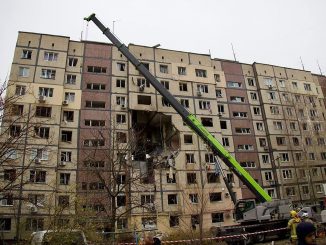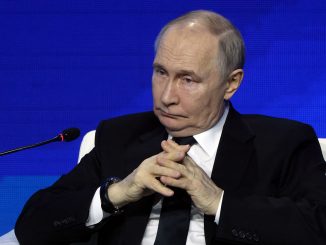
The Victory Day parade on Red Square in 2024.
| Published May 6, 2025
The Kremlin insists it’s still planning a three-day ceasefire – after both sides in the Ukraine war launched strikes that killed civilians. Russia also says American Second World War veterans will attend Moscow’s 9 May Victory Day parade.
Moscow is set to host its annual Victory Day parade on May 9, commemorating the 80th anniversary of the Soviet Union’s victory over Nazi Germany. The Kremlin has announced that 29 foreign leaders are expected to attend, including Chinese President Xi Jinping, Brazilian President Luiz Inácio Lula da Silva, Serbian President Aleksandar Vučić, and Slovak Prime Minister Robert Fico. Other attendees include leaders from countries such as Egypt, Ethiopia, Cuba, and Vietnam .
The parade is anticipated to feature military units from 13 countries, including China, Egypt, and Vietnam. However, Ukrainian authorities have warned that foreign troops marching alongside Russian soldiers would be seen as endorsing Russia’s actions in Ukraine .
In the lead-up to the event, Moscow has experienced drone attacks attributed to Ukraine. On May 5 and 6, Ukrainian drones targeted the Russian capital, leading to temporary closures of all four international airports and several regional airports. While no casualties were reported, debris from intercepted drones caused damage to infrastructure and an apartment building .
In response, Russia has launched retaliatory strikes on Ukrainian cities, including Kharkiv, Kramatorsk, and Odesa, resulting in civilian casualties and property damage. The ongoing conflict continues to strain relations between Russia and Ukraine, with international calls for a ceasefire remaining unheeded.
As Moscow prepares for the Victory Day celebrations, heightened security measures are in place to ensure the safety of attendees and participants. The international community watches closely as the situation develops, with implications for global diplomatic relations and regional stability.
Overall Takeaway:
Moscow’s Victory Day parade, attended by 29 foreign leaders amid wartime drone attacks, underscores a shifting global landscape where Russia remains far from isolated. Despite Western sanctions and condemnation, key countries continue to engage diplomatically, reflecting a divided world order. The event serves as both a powerful symbol of Russia’s enduring alliances and a challenge to Western efforts to contain its influence, all while tensions with Ukraine and NATO remain dangerously high.
SOURCE: THE STRAITS TIMES – Twenty-nine world leaders are expected at Moscow’s World War II victory commemorations, Kremlin says
REUTERS – US WWII veterans will attend Russia’s Victory Day parade, Kremlin says
THE MOSCOW TIMES – Kremlin Says 29 Foreign Leaders to Attend Victory Day Parade in Moscow





Be the first to comment